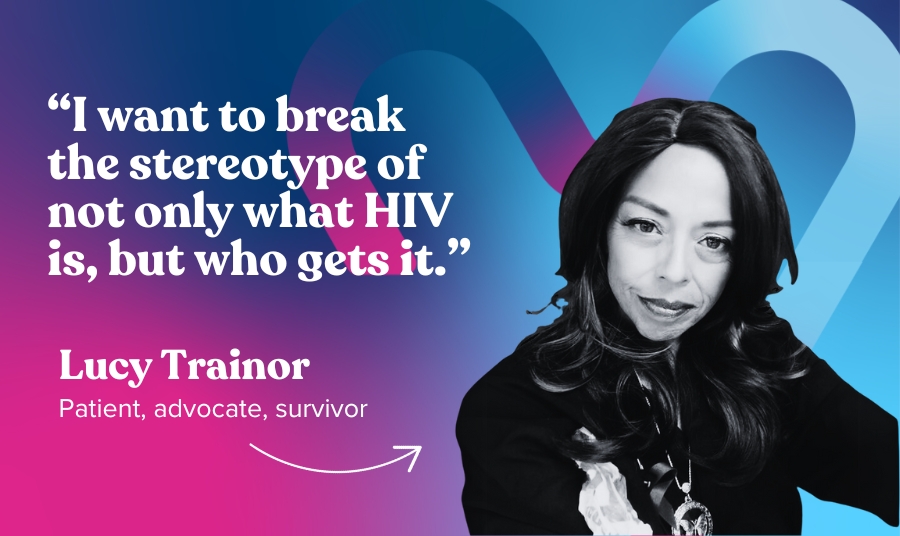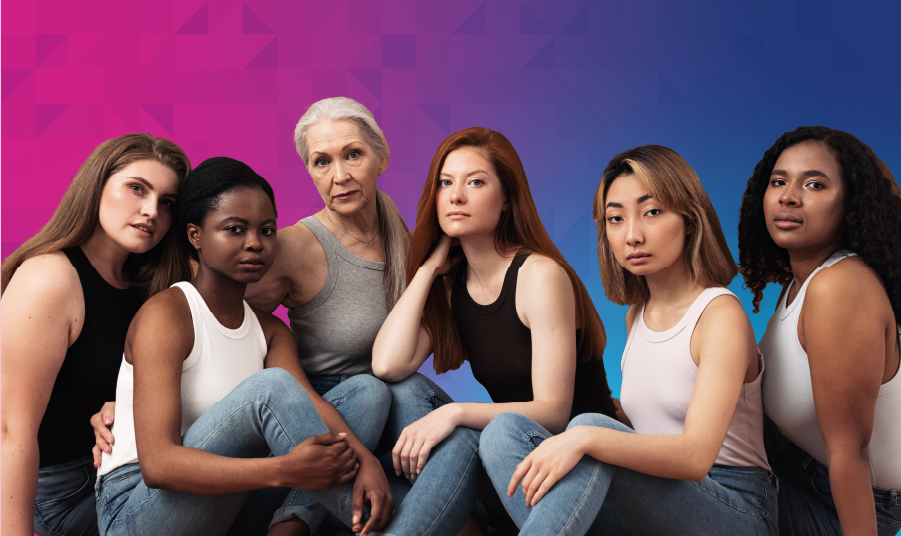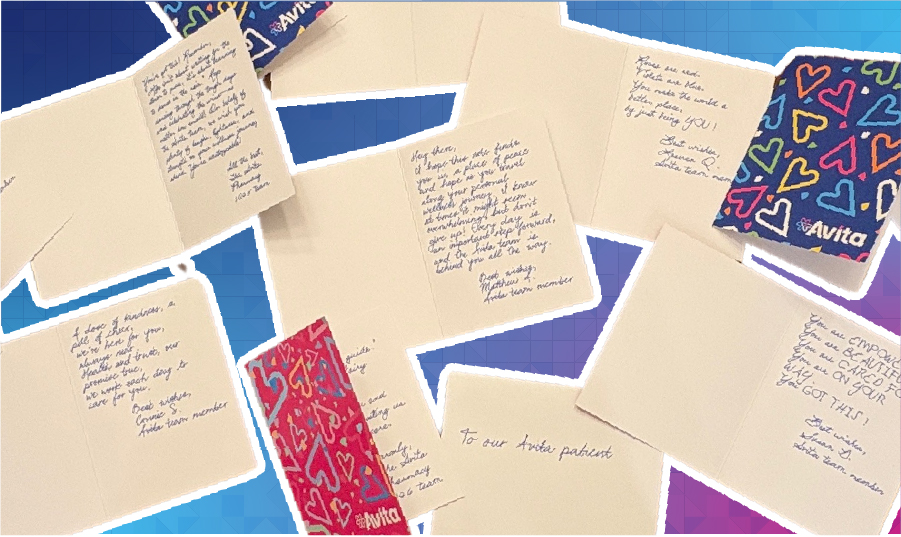How do you describe Lucy Trainor? The patient of Avita Pharmacy and its covered entity partner, Valley AIDS Council, is a long-term HIV survivor and breast cancer thriver. She’s also a peer mentor, support group mobilizer, dog lover, and wig collector (she’ll proudly admit to owning 42 wigs; her canine pack is down to two Dachshunds). She kickboxes, advocates for women’s empowerment, and is a trained research assistant who’s helped collect crucial data on the impact of Rapid Start antiretroviral therapy (ART). Oh, and an interview series she did with Telemundo won an Emmy.
Somehow, that still doesn’t paint the whole picture.
Look, Lucy Trainor is a force. “I want to break the stereotype of not only what HIV is, but who gets it,” she says. “My world has not ended just because of [HIV]. And I don’t have to settle.”
Read on to learn more about Lucy’s extraordinary journey.
I want to break the stereotype of not only what HIV is, but who gets it,” she says. “My world has not ended just because of [HIV]. And I don't have to settle.
Lucy Trainor
Avita Patient, Hiv Survivor and advocate
An HIV diagnosis wrapped in fear and stigma
While Lucy doesn’t let living with HIV define her, she can vividly recall the day she found out about her status—probably because the entire experience was wrapped in a blanket of cruelty, stigma, and fear. It was 26 years ago, two days before Easter Sunday, and Lucy had stopped by the blood donation center to donate plasma.
“The doctor was very cold,” Lucy recalls. “He said, dead flat, ‘Something came out in your blood. You need to go to the community healthcare clinic and get yourself checked. Get checked for all the STDs—especially HIV. You are no longer a candidate to donate here.’”
With the holiday coming up, Lucy had an entire weekend to wait before she could get her official test results. She was afraid to tell her family, worried that they would all hate her and tell her she had it coming because she liked to have fun. But she did tell her best friend.
“Of course, by the next morning, everyone knew,” Lucy says. “When the family gathered for Easter, my sister announced, ‘This might be Lucy’s last year because she’s dying.’” Before the comment, Lucy had felt alone, afraid, and targeted; now she felt something new: anger.
“What she said bothered me to the core,” Lucy remembers. “But I also learned something about myself: When you go negative and limit me, it pushes me even harder.”
When you go negative and limit me, it pushes me even harder.
Lucy Trainor
Avita Patient, Hiv Survivor and advocate
Making the choice to do something positive
Lucy received her official positive HIV diagnosis in a much more compassionate atmosphere—at a clinic run by Valley AIDS Council (VAC), the primary provider of HIV prevention, education, and testing services in the three-county area of South Texas that stretches from the lower Rio Grande Valley on the U.S. and Mexico border. With health centers in Harlingen, Brownsville, and McAllen, Texas, VAC is a non-profit HIV service organization that delivers culturally appropriate sexual health and wellness services and advocates for the Latinx population at the local, state, and national levels.
Her doctor there was encouraging, telling her that they had caught the virus early and that with her T-cell count, they could get her to undetectable status. Still, it was 1999. The World Health Organization had just announced that HIV/AIDS had become the fourth biggest killer worldwide. One year later, President Clinton declared HIV/AIDS a threat to national security. Lucy’s provider encouragingly told her, “You’re going to live a good, long 10 years.”
Ten years was not enough, Lucy thought. “I told him, ‘Watch me, I’ll outdo this,’” she says. “And he said, ‘Okay, just keep strong. You’ll make it.”
Lucy remembers the fear and anger that fueled her 28-year-old self, which she has since explored in therapy. “Fear is a good thing and a bad thing,” she says. “It was good because it scared me enough to do something about it. I had a choice to either sit there and dwell on it or get up and move.”
Right then and there, she made herself a promise: If she could get through the next 24 hours, she would do everything in her power to make things better. “I’ve tried to do something positive because I’m always thinking, ‘If this is going to be my last year, how do I want to go out?’
“Ten years was not enough,” Lucy says with a smile. “Twenty-six years later, and I’m still here.”
Fear is a good thing and a bad thing. It was good because it scared me enough to do something about it. I had a choice to either sit there and dwell on it or get up and move.
Lucy Trainor
Avita Patient, Hiv Survivor and advocate
Finding her people
Lucy knew early on that if she was going to hang on to herself during tough times, she would need help from those who understood what she was going through. “I’m not going to lie to you,” she says about how she felt right after her HIV diagnosis, then pauses to control her emotions. “The negative thoughts take over sometimes because you don’t have the support, even among the family that is supposed to care for you.” So, she joined a support group at VAC. “It was all I had, so I went to it,” she says. “I decided I was going to find my people.”
Elias Cantu, now VAC’s capacity and development trainer, remembers meeting Lucy when the organization started the Peer Mentor Program; she was one of its first graduates. Peer mentors are trained to provide information about the wealth of HIV resources VAC has to offer to new clients or those returning to care. Lucy has also participated in and recruited newcomers for VAC’s various support groups, which are growing exponentially. She was trained as a research assistant for a study about the Rapid Start ART program at VAC, the findings of which were presented at a national conference. When Telemundo called to interview people living with HIV for a special series they were producing, Lucy jumped at the chance to talk.
VAC’s support groups were also a port in the storm when Lucy later fought a breast cancer diagnosis, Elias says. “During group, she would offer updates on every surgery she had (15 to date) and took us along the journey of living with HIV and cancer,” he says. “When she meets new clients in her role as a peer mentor, she introduces herself as someone who is living with HIV and is also a cancer survivor. She says, ‘If I can do it, you can do it.’ It’s incredibly empowering.”
When Lucy meets new clients in her role as a peer mentor, she introduces herself as someone who is living with HIV and is also a cancer survivor. She says, ‘If I can do it, you can do it.’ It’s incredibly empowering.
Elias Cantu
Capacity and Development Trainer
Valley AIDS COUNCIL (VAC)
Inspiring others, overcoming HIV stigma
It’s fair to say that the Avita Pharmacy team located at VAC’s Westbrook Clinic in McAllen, Texas, are also big Lucy Trainor fans. Lucy stops by the pharmacy often, says Avita Pharmacist-in-Charge Briana Reyna, and during every visit, the team learns a bit more about her life. “Her visibility and her openness about her status is essential because she’s not only a woman living with HIV, she’s also someone who has survived cancer,” Briana says.
“On top of that, we’re here in the Texas Rio Grande Valley, steeped in conservative values. Often, living with HIV is stigmatized,” says Briana, who adds that the negative connotation doesn’t seem to bother Lucy. “It’s evident that Lucy hopes to inspire others to overcome that challenge and stigma and let them know they’re not alone,” she explains. “I feel like everything she’s doing is to pay it forward for the support she’s been provided. It shows such bravery. Even if she doesn’t realize it, she’s like a little superhero to many of the people she connects with.”
It’s evident that Lucy hopes to inspire others to overcome that challenge and stigma and let them know they’re not alone...It shows such bravery. Even if she doesn’t realize it, she’s like a little superhero to many of the people she connects with.”
Briana Reyna, PharmD, AAHIVP
Pharmacist-in-Charge, Avita Pharmacy
An outspoken proponent of facing your fears
Twenty-six years after Lucy’s diagnosis, there is now much more information available about HIV. And yet, “People still think that it [contracting HIV] is not going to happen to them. That’s a big part of the stigma,” she explains. “And I’m sorry to say, but a lot of the hetero women get left behind, and it bites.”
Some people are intimidated by her outspokenness, Lucy says. “Yes, I am outspoken. But I once took whatever was fed to me because I didn’t know better.”
She encourages everyone, male or female, to face their fears and get tested for HIV. “If you’re scared, take someone you trust with you, she advises. “I know someone scared [about an HIV diagnosis] right now. But he thinks he’ll be okay because he’s seen me after all these years, and I’m in better health than him.”
Lucy Trainor’s world has not ended because of HIV. She has not settled. And she doesn’t want anyone else to either.
Yes, I am outspoken. But I once took whatever was fed to me because I didn’t know better.
Lucy Trainor
Avita Patient, Hiv Survivor and advocate



